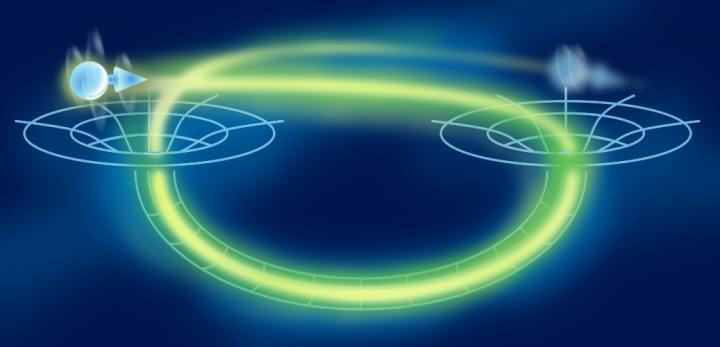Physicists explain how to solve difficult mathematical problems with time travel computing

Sending a locked message back in time of which no one will ever read the contents can help solve difficult problems, according to an international team of scientists. They state that if one were to entangle the locked message with another laboratory system before sending it back in time, then the entanglement creates a strange effect in quantum physics that sees it establish correlations between the message which has been sent back in time and the laboratory system that it has become entangled with. This, they say, can help solve difficult mathematical problems.
Dave Bacon of Google proved a decade ago that a time-travelling quantum computer was able to solve NP-complete – a group of difficult mathematical equations. However, Bacon's quantum computer was only able to travel through "closed timelike curves" – a path through the fabric of spacetime that loops which is made possible through wormholes in spacetime. Physicists argue closed timelike curves can be dangerous due to causality – the theory in which someone could go back in time and alter the future, such as killing your own grandad – as the classic example goes.
Breaking the flow of time can wreak havoc on quantum physics, with researchers proving the basic principles of quantum physics cease in closed timelike curves. However, new research, led by Mile Gu from the Centre for Quantum Technologies (CQT) at the National University of Singapore and Tsinghua University in Beijing, shows quantum computers can solve these problems when travelling in "open timelike curves", which do not have an effect on causality due to the fact that they do not interact with objects in the past, according to the study published in npj Quantum Information.
"Nevertheless, the strange quantum properties that permit 'impossible' computations are left intact," read a press release. "We avoid 'classical' paradoxes, like the grandfathers paradox, but you still get all these weird results," says Gu.
"Whenever we present the idea, people say no way can this have an effect," says Jayne Thompson, a co-author at CQT. "The reason there is an effect is because some information is stored in the entangling correlations: this is what we're harnessing."
© Copyright IBTimes 2025. All rights reserved.






















